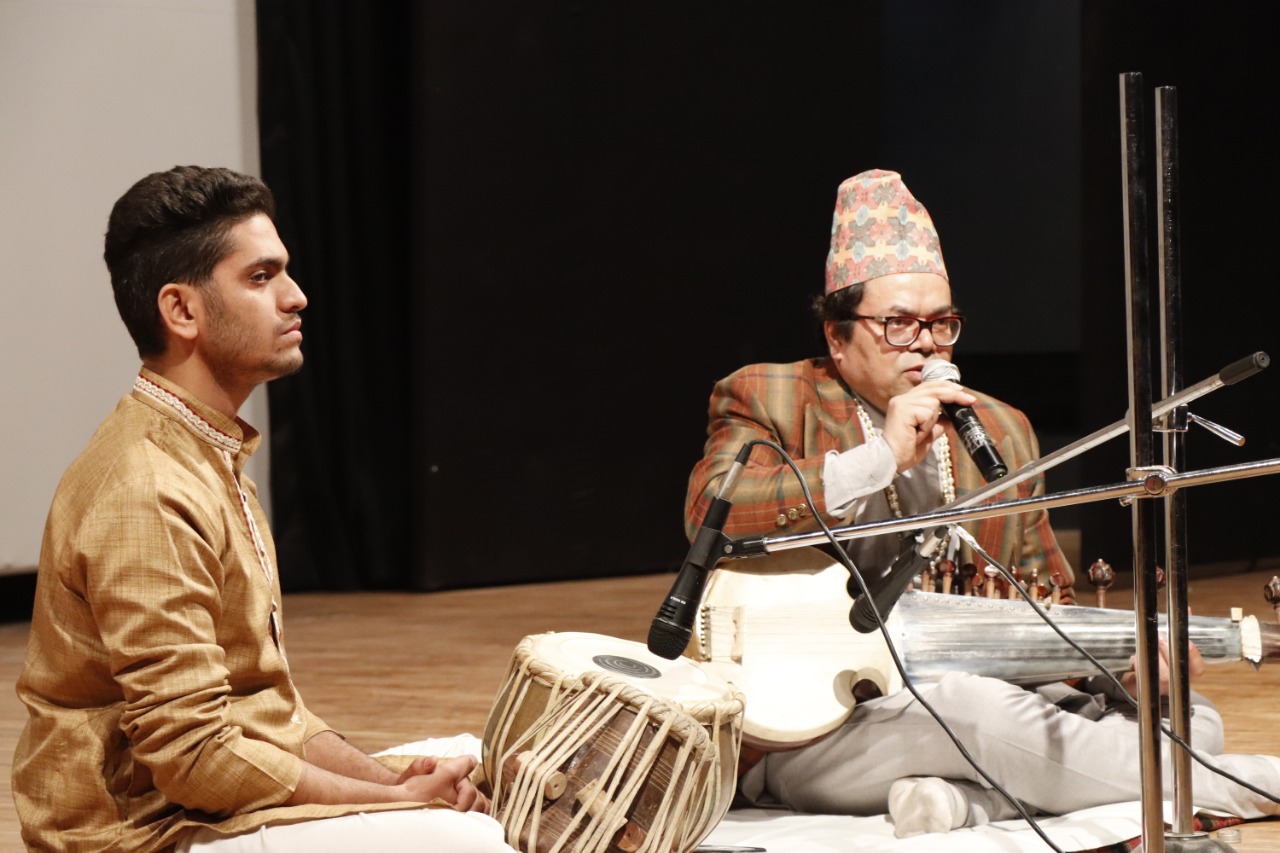A Nepali sarod maestro who needs to perform in India to make a living

In his career of more than three decades, Ustad Sudarshan Rajopadhaya has sung and composed more than 100 songs, mostly in Nepali and Nepal Bhasa, yet it’s tough for him to find an audience to perform for. In a quiet room at his home in Gabahal, Patan, Ustad Sudarshan Rajopadhaya swiftly starts playing the sarod—a stringed classical instrument—completely captivating the only audience around, me. He has been playing the instrument for the past 30 years, never missing his daily riyaz (practise). And it seems like he can play the instrument even when he’s blindfolded. His room is adorned with medals, certificates and other musical instruments. But the sarod is what speaks to his soul; it is his most prized possession.
A music enthusiast since his childhood, Rajopadhaya, now 50, considers his father, also a classical musician, as someone who inspired him to follow the musical path. “Seeing my father playing the esraj— a stringed instrument—I was inspired to join classical music, as I understood the value of providing a spiritual experience to listeners,” says Rajopadhaya, who can also play the guitar, sitar, harmonium and tabla.
For someone exposed to many musical instruments, Rajopadhaya made the decision to play the sarod at a very young age—at 15—knowing full well that choosing to play it was a huge risk. This was because there were no sarod teachers in the country, says Rajopadhyaya, and a future in it wasn’t exactly promising. And yet this was what he wanted to learn and be good at.
Recalling the first time he heard the sarod, Rajopadhaya says that it was one particular performance of Ali Akbar Khan, the legendary Indian classical musician, he had listened to in a programme on All India Radio, that drew him towards the instrument.
“I immediately fell in love with the sound and the mood the instrument created. I told my father to arrange a teacher for me so I could also play it,” he says.
In the pursuit of his passion, Rajopadhaya went to India to learn the instrument to get formal training. And after a few years, he started writing, singing and composing songs.
With time, he mastered the art of playing the sarod but there weren’t many opportunities in the country for him to perform and showcase his talent. This led him to accepting offers to perform in various cities in India, where the demand for his talent was high. His shows in India is a major source of his income, he says.

Photo Courtesy: Ustad Sudarshan Rajopadhaya
“It’s like the Indian audience is responsible for my livelihood because it’s the shows I do there through which I earn,” says Rajopadhaya who is also known by the name, Ustad Yesraj.
But this was not always the case. According to him, before Nepal became a republic in 2008, classical music was given special importance by the government itself. “Radio Nepal gave air time to classical musicians to play their instruments,” he says. They also received a certain amount which was a source of living for musicians like him. But the practice soon faded away and musicians like him had to seek other sources of income.
The shifting musical choices of the Nepali audience has also affected the classical music industry in Nepal. With the current generation preferring newer genres of songs, the market for classical music has become limited. Despite this shrinking of market, Rajopadhaya says those who prefer classical music will always find a way to it. “I once did a concert in Shilpee Theatre which went housefull. If the organisers show interest in organising classical shows, there will be an audience for it,” he says.
The responsibility on the promotion of classical music shouldn’t solely lie in the hands of the audience, he says. Highlighting on how Nepal government has failed to award him for his contribution, Rajopadhaya believes that without strong government support, the country will fail to utilise the potential classical music talents.
But he hopes that with time, things will change, and he says the interest shown by the current generations in learning to play classical instruments are positive signs of change. “I teach classical music to a bunch of students who are really passionate about it. Things can change if they get opportunities to showcase their talents,” he says.
In his musical career of more than three decades, Rajopadhaya has sung and composed more than 100 songs mostly in Nepali and Nepal Bhasa. But nothing provides him immense happiness more than playing the sarod. “I can play the sarod the whole day,” says Rajopadhaya. “It’s a form of meditation for me.”
He hopes with social media apps like YouTube, which allows the dissemination of contents to larger masses, his talent will find more admirers. “I think increasing my digital presence will help in creating a market, where I can thrive alongside following my passion of playing sarod,” says Rajopadhaya.
From : Kathmandupost













 Nagarik Post
Nagarik Post 